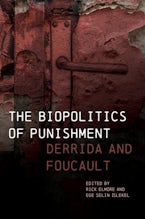PHILOSOPHY / Movements / Post-Structuralism
Showing results 1-4 of 4
Filter Results OPEN +

Embracing the Void
Renowned psychoanalytic philosopher Richard Boothby puts forward a novel theory of religion inspired by Jacques Lacan’s theory of das Ding. The book offers the theoretical tools for interpreting religious belief and analyzes several faith traditions.
The Biopolitics of Punishment
The Biopolitics of Punishment marks a new chapter in the long-standing debate between Jacques Derrida and Michel Foucault. The essays collected in this volume chart the undertheorized dialogue between the two philosophers on questions of life, death, punishment, power, and resistance.
A Search for Clarity
This book is the definitive statement on how Lacan viewed the relationship between psychoanalysis and science.
The Powers of Sensibility
In The Powers of Sensibility: Adorno, Foucault, and Rancière on Aesthetic Politics, Michael Feola considers the role that aesthetic resources (perception, sensibility, and feeling) can play within a thinking (or rethinking) of emancipatory politics.

Embracing the Void
Renowned psychoanalytic philosopher Richard Boothby puts forward a novel theory of religion inspired by Jacques Lacan’s theory of das Ding. The book offers the theoretical tools for interpreting religious belief and analyzes several faith traditions.
The Biopolitics of Punishment
The Biopolitics of Punishment marks a new chapter in the long-standing debate between Jacques Derrida and Michel Foucault. The essays collected in this volume chart the undertheorized dialogue between the two philosophers on questions of life, death, punishment, power, and resistance.
A Search for Clarity
This book is the definitive statement on how Lacan viewed the relationship between psychoanalysis and science.
The Powers of Sensibility
In The Powers of Sensibility: Adorno, Foucault, and Rancière on Aesthetic Politics, Michael Feola considers the role that aesthetic resources (perception, sensibility, and feeling) can play within a thinking (or rethinking) of emancipatory politics.




